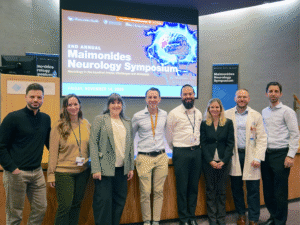Amyloidosis has long been considered a rare condition. However, more people are living with this problem than most doctors realize.
Maimonides Health is taking the lead in identifying this potentially life-threatening condition. Through Maimonides’ amyloidosis screening program, our Heart & Vascular Institute experts diagnose patients early and start appropriate treatments as quickly as possible, says Howard Newhouse, MD, Maimonides clinical and nuclear cardiologist.
“Recent data shows that amyloidosis is much more prevalent than initially thought. It’s been detected in up to 25% of patients over age 80,” he says. “It’s a condition that can affect multiple organ systems. So, there are numerous consequences associated with misdiagnosing amyloidosis and leaving it untreated.”
What is Amyloidosis?
Amyloidosis is a protein misfolding disorder that leads to amyloid deposits in the heart, the kidneys, the nervous and musculoskeletal systems, and other organs. It can present with a variety of symptoms depending on which organs are involved, complicating diagnosis. Over time, it can cause significant damage to organs and lead to problems like heart or kidney failure. Amyloidosis is more common in men, and its incidence increases with age. Genetic mutations can cause some types of amyloidosis that occur in families.
According to Dr. Newhouse, detecting amyloidosis is difficult because the signs and symptoms are often nonspecific and are common in other conditions. They include shortness of breath, fatigue, constipation, back pain, neuropathy, and dizziness. Clinicians may not immediately make the association of these complaints with amyloid. As a result, diagnoses are often delayed by more than six months. That’s a problem because amyloidosis is a progressive disease that worsens when left untreated.
“One of the big problems with diagnosing amyloidosis is that it mimics other health problems,” he says. “For example, a cardiologist is more likely to attribute an arrhythmia or congestive heart failure to more common conditions, such as hypertension or valve disease rather than amyloidosis. The symptoms are similar, so many providers don’t necessarily make the connection that their patient is dealing with amyloidosis. Consequently, the treatments they recommend may be less effective.”
The Screening Process
The initial phase of the Maimonides screening program focuses on detecting heart-related amyloidosis, Dr. Newhouse says. The first step is educating primary care providers about the red flags that should trigger a screening referral. Providers should consider referrals for patients with the following:
· Ventricular wall thickening despite well-controlled blood pressure
· Repeated readmissions for congestive heart failure without improvement
· Intolerance to heart failure medications
· Persistent low-level troponin elevation
· Unexplained arrhythmia
· Orthostatic hypotension
· Bilateral carpal tunnel syndrome
Providers who suspect cardiac amyloidosis with increased LV wall thickness on echocardiography can request screening tests through Maimonides’ regular ordering system and electronic medical record. The screening is a two-step process, and the results help direct treatment decisions.
During screening, patients undergo blood and urine tests to measure protein levels and rule out light-chain (AL) amyloidosis, which is an urgent medical condition that requires treatment by an oncologist. Once AL amyloidosis is excluded, a pyrophosphate (PYP) scan is performed. The PYP scan uses the radioactive tracer Tc99m-PYP and a nuclear medicine scanner to create a 3D picture of the heart that reveals amyloid deposits.
“If screening results are abnormal, we refer patients to the appropriate care team,” Dr. Newhouse says. “Whether it’s the heart failure or arrhythmia team, we direct patients to the experts who can recommend the best treatments and monitor their condition.”
Timely Treatment Improves Outcomes
Effective amyloidosis screening opens the door for targeted treatments. Dr. Newhouse says this type of early detection is vital because appropriate therapy limits the impact the condition has on a patient.
“Current treatments don’t cure the disease or undo the deposits of amyloid that cause dysfunction,” he says. “But it does slow the disease down. So, if you can diagnose amyloidosis and begin treatment early, you can prevent someone from getting to a late stage of congestive heart failure, and prolong survival.”
Depending on the type of amyloidosis a patient has, specialists can recommend bone marrow transplant, chemotherapy, or medication.
Comprehensive Multidisciplinary Care
Amyloidosis is a multi-organ condition that frequently requires a multi-subspecialty approach. Maimonides brings together a team of cardiologists, hematologists, oncologists, neurologists, genetic counselors, and pharmacy professionals to deliver a comprehensive, convenient screening experience.
“The most important thing is for providers to realize that amyloidosis really isn’t rare, so they need to know the red flags and refer patients as soon as possible,” he says. “At Maimonides, we make it easy for the provider to call us for advice and order the test. Then, we use our expertise to diagnose and help these patients.”
Learn more about Maimonides Heart & Vascular Institute or call (718) 478-2328 to refer a patient.




